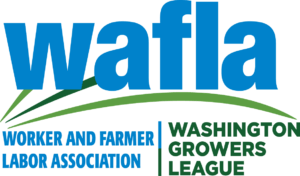Bill proposes studying 'cracks' in H-2A program

Bill proposes studying 'cracks' in H-2A program
Capital Press
U.S. Rep. Lori Chavez-DeRemer, R-Ore., is lending her support to a bill that aims to address "cracks" in the H-2A program for seasonal agricultural guestworkers.
The Farm Workforce Support Act was introduced in April by Reps. Gabe Vasquez, D-N.M., and Juan Ciscomani, R-Ariz. Chavez-DeRemer, a freshman representative from Oregon's Willamette Valley, signed on as a co-sponsor in June.
H-2A visas are certified by the Department of Labor and issued by states to fill seasonal agricultural jobs, such as picking and packaging crops.
The number of visas issued nationwide has increased every year since 2012. So far in fiscal year 2023, the DOE has received 14,408 H-2A applications — up 11.4% over the previous year — and certified 206,096 positions.
The top five states for H-2A positions are Florida, California, Washington, Georgia and North Carolina.
Chavez-DeRemer, a member of the House Agriculture Committee, said she has heard from farmers worried about rising labor costs and worker shortages as part of a series of listening sessions to discuss the upcoming 2023 Farm Bill.
"There's lots of places, (and) many industries, that are hurting from a workforce shortage," Chavez-DeRemer told the Capital Press. "In our district and around the state of Oregon, we've had dairy farms close due to labor costs."
In order to incentivize more labor, Chavez-DeRemer said the Farm Workforce Support Act would direct the Government Accountability Office to study deficiencies in the H-2A program, setting the stage for possible improvements.
What's the bill do?
Specifically, the bill would require a report analyzing five key areas:
• The impact that H-2A has had on hiring, and whether there is an increasing reliance on the program.
• Problems with securing adequate housing for guestworkers.
• Employers' compliance with working conditions guaranteed in H-2A contracts.
• Wage rate requirements, and whether they hinder the ability to hire workers.
• The economic impact of wages lost from spouses and unmarried adult children of visa recipients being unable to work.
"We want to make sure this program doesn't have so much red tape that farmers, ranchers and producers don't want to use it," Chavez-DeRemer said.
'Need for reforms' urgent
Scott Dilley, public affairs director for Wafla, the country's third-largest H-2A employer based in Olympia, Wash., said the group is "always open to more study and more data about H-2A," though the need for reforms is growing more urgent.
"We'd certainly hope that, while studies are important, we don't forget about doing some kind of work to address H-2A reform as quickly as possible," Dilley said. "Because farmers here in America can't find enough workers, the only other way they can go about doing this is bringing in workers through H-2A."
Other reforms proposed
The Farm Workforce Support Act is not to be confused with another bill, the Farm Workforce Modernization Act, which was reintroduced for the third time this year by Reps. Dan Newhouse, R-Wash., and Zoe Lofgren, D-Calif.
That proposal includes some reforms for H-2A, such as streamlined recruiting and capping wage rate increases, while also creating a new path to citizenship for agricultural workers.
Dilley said Wafla remains concerned about aspects of the Farm Workforce Modernization Act. For example, he said the wage rate caps seem arbitrary, as opposed to market-based.
As for the Farm Workforce Support Act, Dilley said he wants to see more details about how the study will be conducted to ensure it stays objective.
"There's nothing there that lays out who needs to be interviewed, or which data will be used," he said. "Will there be stakeholder input? What will that look like? ... I think it would help if we had more specifics in it about what that study looks like, because we don't want it to be one-sided."
Chavez-DeRemer said she recognizes the need for urgent action. While the bill does not include a timeline for submitting a report back to Congress, she is optimistic that it will be a step in the right direction.
"Sometimes in government, we like to wait a long time to get things done," she said. "But this is a pressing issue."
